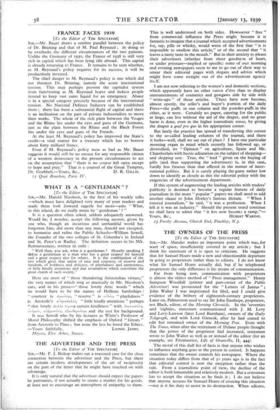WHAT IS A " GENTLEMAN " ?
[To the Editor of THE SPECTATOR] SIR,—Mr. Harold Nicolson, in the first of his weekly talks —which must have delighted very many of your readers and made them look forward eagerly for more—asks " What,
in this island, do we really mean by ' gentleman ' ? "
It is a question often asked, seldom adequately answered. Would he, I wonder, accept the following answer, given by one who, though an incurious and unthankful world has forgotten him, did more than any man, Arnold not excepted, to humanise and refine the Public Schools—William Sewell, the Founder of the two colleges of St. Columba's in Ireland and St. Peter's at Radley. The definition occurs in his MS. Reminiscences, written in exile :
" Well then, you ask, what is a gentleman ? Morally speaking I define a gentleman as a man who has a great respect for himself and a great respect also for others. It is the combination of the two which gives that union of ease and courtesy, of reserve and freedom, of boldness and delicacy, of playfulness and earnestness, of little kindly attentions and due assumption which constitute the great charm of such society."
Here are most of " those thundering Aristotelian virtues," the very names of which ring so musically in Mr. Nicolson's
ears, and in his prose—" those lovely Attic words " which he would have to be the names of Hellenic battleships : " courtesy is T.-puArns, " reserve " is (116(6s, " playfulness " is Aristotle's arparala, " little kindly attentions " perhaps " that lovely 40X/4A rts--a certain kindliness " with Smatoo-t177, 01.40(r(1-17. i'Aer0Epu;rns and the rest for background. It was Sewell who by his lectures as White's Professor of Moral Philosophy shifted the emphasis of Oxford " Greats "
from Aristotle to Plato ; but none the less he loved the Ethics.
—Yours faithfully, LIONEL JAMES.
Movses, Five Ashes, Sussex.






































 Previous page
Previous page